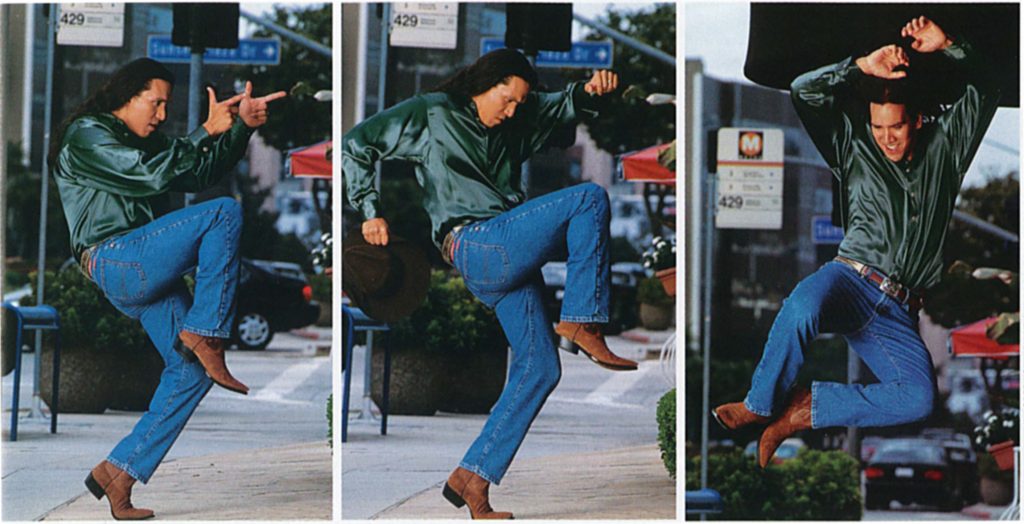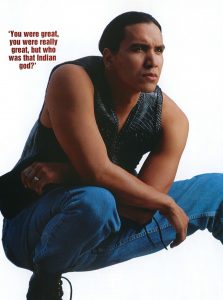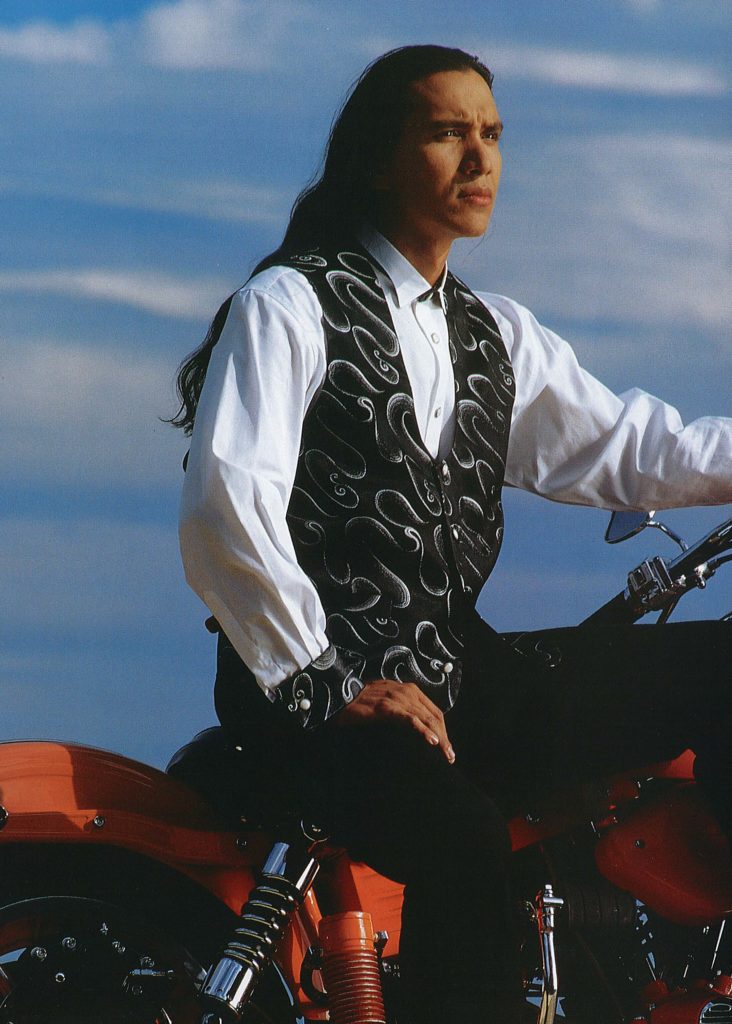First as a ballet dancer, then as an actor, this hot new star goes beyond stereotypes.
For a while, around the time of Dances With Wolves, the most-talked-about Native American actor in Hollywood was Rodney A. Grant. Then, around the time of The Last of the Mohicans and Geronimo, it became Wes Studi. Now...the actor to know about is Michael Greyeyes.
One look at this guy and you can see why. At 6'2" and 200 pounds, he's got a dancer's grace (he spent a decade on the ballet circuit) and an athlete's muscles. Full-lipped, with shoulder-length dark hair and wide-set, steady eyes, 30-year-old Greyeyes is full-blooded Cree.
As for his dramatic abilities — well, as the romantic lead in the highly-rated telemovie Stolen Women, he was bold enough to convince Janine Turner that life in the pioneer fort was drudgery compared to sharing his tent; in the popular cable movie Crazy Horse, he carried out a vision of a spiritual warrior with enormous charisma; and in the miniseries True Women, he developed a speech pattern for his threatening yet proud Tarantula that gave new meaning to the term "broken English." He seems to have the chops for that expansion of self and heightened awareness that Stanislavski considered so key to believable acting.
HIGH FLYER: Dance moves on Sunset Boulevard
Greyeyes has been quickly swept up in a whirl of...roles — a two-episode stint...on Dr. Quinn, Medicine Woman; another...on Millennium; parts in TV's Rough Riders and Magnificent Seven; and finally, a big budget action feature, this winter's Firestorm, alongside Scott Glenn and Howie Long. No wonder A-list director Jan De Bont (Twister) has been considering him for his sci-fi/Western, Ghost Riders in the Sky.
While Greyeyes is physically so consummate so as to be idealized, he is in his personal life hardly stereotypical. Although he rides a horse bare-back and deep-seated on-screen, real life finds him allergic to animals. He's never lived on a reservation, but mostly in Toronto, New York, and now Cleveland, and admits, "I'm really a city boy." To get out in nature he neither hikes nor tracks nor hunts, but bicycles with his Polish-American dancer wife, Nancy Leroszewski, who performs with the Cleveland Ballet.
Even if he is rarely there, he does carry in high regard the region he considers his ancestral home, Saskatchewan. There, he spent his childhood and often visited his mother's true home, the Sweetgrass Reserve, as well as his father's, the Muscade Lake Reserve. "The landscape is quite flat," he describes, "but there are gentle rolling hills and beautiful sky. It's a little like Montana. Our nation is called the Plains Cree Nation."
Having been born in Canada, Greyeyes could rightly consider himself Cree, Canadian, or American. He says, "My principal identity is that I'm Cree. When I'm with other Indian people, it's like we are one. But our identities are distinct within Native American communities. The Cree are known for their artists." He mentions such Cree actors as Gordon Tootosis and Tantoo Cardinal (both in Legends of the Fall) and Cree painter Kent Monkman.
Although he was taken with powwow dancing (and continues to practice it), Greyeyes spent his teens studying at The National Ballet School in Toronto, then joined the National Ballet of Canada. It went well for him: "I was a rarity, I was treated like royalty. As a girl you have to kill yourself, but with guys there are very mediocre guy dancers out there and they have jobs because there's a shortage of guys, so I lucked out."
He walked away from that life five years ago for the same reason most dancers do - "I'd come home at six, seven, absolutely exhausted. Too tired to make dinner. I'd sit there, I had five or six ice bags on various different parts of my body and I was throbbing with pain. I was like, 'This isn't living."
Greyeyes switched careers, and he got lucky again — luck being one of the refrains he identifies in his life. "I got into Hollywood at a time when it was right to cast real Indian people in these roles. By virtue of that, I was auditioning for these parts against less competition. Instead of 1,000 guys reading for Crazy Horse, there were 50 guys. And politically, it was impossible not to cast a full-blood in that role."
He made his own luck when Stolen Women aired on CBS — and hundreds of viewers clamored to know who this hunky newcomer was. "My agents started to complain, 'We're getting calls and letters every day.' I went by CBS and they said, 'We have been getting so many calls, we have never received calls like that.' People were like, 'Who is this guy?'" Greyeyes laughs, adding, "You know the girl who played Sarah White in that film? The one who hated being with us [the Lakota Sioux]? She had hysterical lines like, 'You'll never make me into one!' Well, she said one of her friends who watched it in New York said, 'You were great, you were really great, but who was that Indian god?'"
He proved popular again in True Women, so much so that crew members began mimicking the halting speech of his Comanche character, like how he told Dana Delaney, "You ... will walk ... again ... but not good. You ... will not ... ride horse with wings . . . again." Today, Greyeyes chuckles, recalling, "Everyone was imitating the way Tarantula spoke. They'd say, 'You ... come to my bed ...hey, Michael.' The cameramen, the grips, everyone was imitating me. What do they say — it's the highest form of flattery?"
Although he is frequently cast to play proud and withdrawn characters, Greyeyes can readily slip into humor. Asked if his animal allergies mean he can't groom his own horse, he agrees, "I've got the perfect excuse! My nose will swell up. I'll look terrible. My eyes will clam shut." And does being married to a dancer mean he and his wife heap on the veggies and tofu? "Try, like Burger King and McDonalds and KFC. Dancers, just to let you know, are notorious junk food eaters."
This lighter side gets tapped in Firestorm, playing a helicopter pilot who flies smoke-jumpers like Scott Glenn around as they struggle to stanch a forest fire that was started as camouflage for a prison break. "I play a happy-go-lucky guy. In general, I play a lot of tough guys, but he's different — Andy Mooseheart. The first scene I'm in, I'm fooling around in my helicopter singing 'Whiskey in a Bottle' by Thin Lizzie, bopping around."
So — how about Greyeyes' opinions of those Native American movies he hasn't been in? For starters, Dances With Wolves? "It was fantastic, especially in its attention to the details." Powwow Highway? A great movie, especially Gary Farmer. Any movie that shows Native people in the present is a step in the right direction." Legends of the Fall? "I thought it was too slow-moving." Black Robe? "Loved it. Augie Schellenberg was incredible, he's a mentor to me." The Last of the Mahicans? "I know Wes Studi and I got scared of him!" Walter Hill's Geronimo: An American Legend? "Didn't like it. Instead of calling it 'Geronimo' they should have called it, The Four Guys Who Chased Geronimo." Cable's Grand Avenue? "Amazing, one of the best things I've seen on HBO."
Although he's made quick strides in Hollywood and travels in cosmopolitan circles, Greyeyes is no stranger to cultural confusion. "I'm still startled by the ignorant things I hear," he says. "It can be subtle, or other times it can be like, 'Canada. Do you live in igloos?' Dumb stuff like that." He recalls a woman who recently boasted to him how she was so into appropriating sacred Native sweats and ceremonies and rituals. "She was saying, 'But don't you think spirituality has a universalism and don't you feel we should be able to share this knowledge with each other?' I said to her, 'Well, I could probably say, I really love what Catholics are doing and it says a lot to me and I think it's important so we're celebrating mass at our house, we're giving communion. How would you feel if I said that to you?"' Greyeyes is equally adamant that Indian nations should not be taxed on profits made from casinos.
As attached as he is to his Native identity, Greyeyes hopes not to be pigeon-holed by it: "I've been very fortunate to get a lot of these great roles because I'm Native. But if I'm limited to these roles then when Westerns go out of fashion, I'll be out of work. I'd love to do modern films, I'd love to be a cop," he says. And yes, he'd even move to L.A. if he had to.
This story originally appeared in our March 1998 issue
Photography: (All images) Studio Seven Productions

















